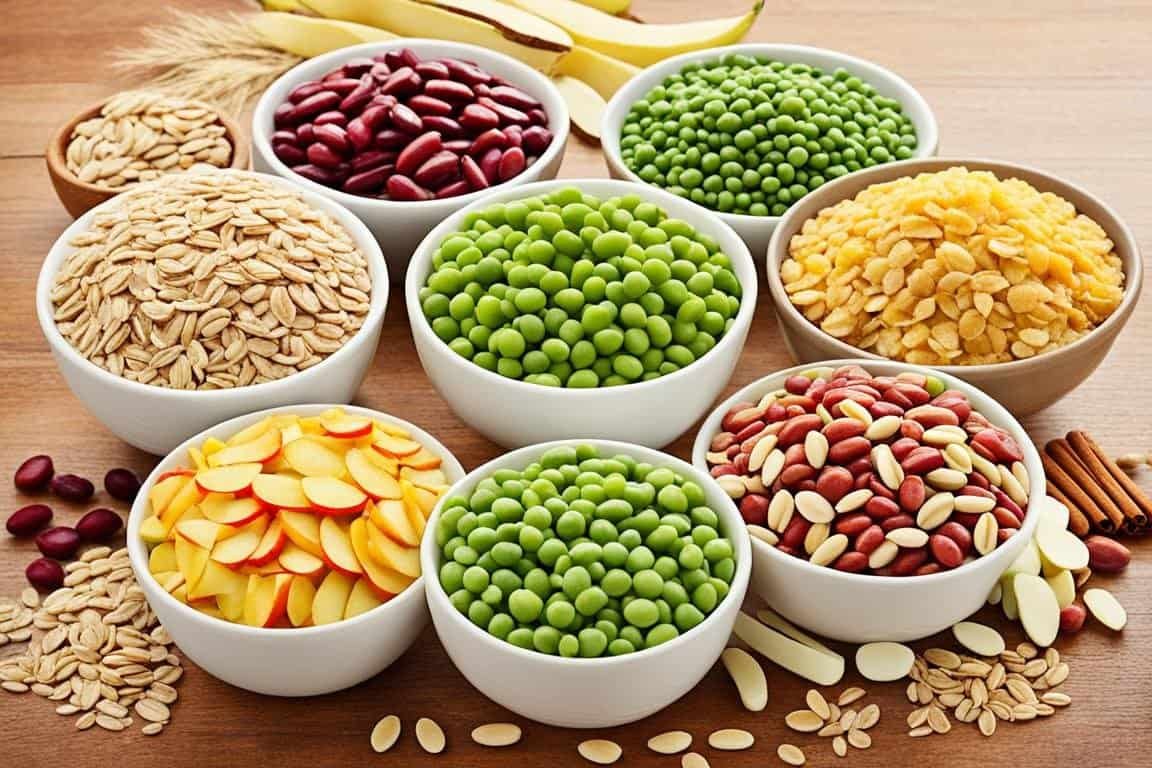Welcome to our guide on cholesterol and diet! When it comes to managing cholesterol levels and making informed dietary choices, it’s crucial to rely on trustworthy sources of information. With so much conflicting advice and misinformation on the internet, finding reliable sources can be overwhelming. That’s why we have compiled a list of reputable websites and resources that provide accurate and up-to-date information on cholesterol and diet.
Whether you’re looking for cholesterol-lowering tips, information on the role of specific nutrients, or the latest research on heart-healthy diets, these sources are your go-to references. With their credible information and evidence-based recommendations, you can confidently make choices that promote your heart health and overall well-being.
Below are some trusted websites and resources that offer accurate and reliable information on cholesterol and diet:
- American Heart Association
- Mayo Clinic
- American Society for Nutrition
- National Heart, Lung, and Blood Institute
- World Health Organization
These websites provide accurate, evidence-based information on cholesterol and diet, covering a wide range of topics from the impact of specific nutrients to practical tips for lowering cholesterol levels through diet. Make sure to explore these resources and consult them whenever you have questions or need guidance on cholesterol management.
Key Takeaways:
- Trustworthy sources play a crucial role in accessing reliable information on cholesterol and diet.
- Reputable websites like the American Heart Association and Mayo Clinic provide accurate and evidence-based information.
- Consulting reliable sources ensures you can make informed decisions about your cholesterol management.
- Explore reputable resources for the latest research, tips, and recommendations on cholesterol and diet.
- By relying on trustworthy sources, you can lead a heart-healthy lifestyle and reduce the risk of heart disease.
The Impact of Soluble Fiber on Cholesterol Levels
Soluble fiber plays a crucial role in managing cholesterol levels and promoting heart health. By incorporating soluble fiber-rich foods into your diet, you can experience the cholesterol-lowering effects that contribute to a healthier you.
How exactly does soluble fiber help lower cholesterol? When you consume soluble fiber, it forms a gel-like substance in your gut that binds to bile. Bile is made from cholesterol and is responsible for digesting fats. Increased bile excretion leads to a decrease in cholesterol levels as your body will use the cholesterol present in your blood to produce more bile. The soluble fiber prevents bile reabsorption, resulting in the excretion of both bile and cholesterol through your stool.
So, which foods are rich in soluble fiber? Include beans, legumes, whole grains, flaxseeds, apples, and citrus fruits in your diet. These soluble fiber-rich foods not only provide essential nutrients but also contribute to your overall heart health.
Experts recommend consuming at least 5-10 grams of soluble fiber daily to experience the cholesterol-lowering benefits. However, even lower intakes of 3 grams per day can still have significant effects on your cholesterol levels.
To help you visualize the soluble fiber content in common foods, refer to the table below:
| Foods | Soluble Fiber Content (per serving) |
|---|---|
| Beans (cooked) | 1-2 grams |
| Legumes (cooked) | 1-2 grams |
| Whole Grains (quinoa, oatmeal) | 1-2 grams |
| Flaxseeds (ground) | 2 grams |
| Apples (with skin) | 1 gram |
| Citrus Fruits (oranges, grapefruits) | 1 gram |
Incorporating soluble fiber-rich foods into your daily meals can help you lower your cholesterol levels and support your heart health. So, make sure to include these wholesome options in your diet for maximum benefits.
Remember, a healthy lifestyle, including a balanced diet and regular physical activity, is key to managing your cholesterol levels effectively. Stay committed to making heart-healthy choices, and you’ll reap the long-term benefits of better cardiovascular health.
The Role of Fruits and Vegetables in Lowering LDL Cholesterol
Consuming at least four servings of fruits and vegetables daily can be incredibly beneficial for lowering LDL cholesterol levels. These nutrient-rich foods are packed with antioxidants, which play a vital role in reducing the risk of heart disease.
Antioxidants found in fruits and vegetables help prevent LDL cholesterol from oxidizing and forming plaques in the arteries. This is important because oxidized LDL cholesterol is more likely to contribute to the development of heart disease. By incorporating a variety of fruits and vegetables into your daily diet, you can increase your intake of these powerful antioxidants and promote a healthy heart.
Several studies have shown that individuals who consume higher amounts of fruits and vegetables have a lower risk of developing heart disease over time. The protective effects of fruits and vegetables can be attributed to their rich fiber content, as well as the multiple vitamins, minerals, and phytochemicals they contain.
One effective way to ensure you’re getting enough fruits and vegetables is to aim for at least four servings per day. A serving can be one medium-sized fruit, half a cup of fresh or frozen fruits, or one cup of leafy greens or chopped vegetables. The more colorful the produce, the better, as different colors indicate a variety of beneficial nutrients.
Adding fruits and vegetables to your daily meals is a simple and delicious way to support your heart health and reduce the risk of heart disease. Whether enjoyed as a snack, incorporated into salads, or cooked as part of main dishes, the versatility and abundance of fruits and vegetables make it easy to prioritize their consumption.
| Fruit | Serving Size | Fiber Content (g) | Example |
|---|---|---|---|
| Apple | 1 medium | 4.4 |  |
| Orange | 1 medium | 3.1 | |
| Spinach | 1 cup | 4 | |
| Broccoli | 1 cup | 2.4 |
By including a variety of fruits and vegetables in your diet, you can take advantage of their cholesterol-lowering compounds and improve your heart health. Remember to make colorful choices and aim for at least four servings each day. Your heart will thank you!
The Benefits of Unsaturated Fats and the Dangers of Artificial Trans Fats
When it comes to managing your cholesterol levels, the type of fats you consume plays a crucial role. While saturated fats and trans fats can raise your cholesterol levels and increase the risk of heart disease, unsaturated fats have the opposite effect, helping to lower both total cholesterol and LDL cholesterol levels.
Unsaturated fats are considered heart-healthy fats because they can improve your cholesterol profile. These fats can be found in foods such as avocados, olives, fatty fish like salmon and mackerel, and various nuts and seeds. By incorporating these sources of unsaturated fats into your diet, you can make a positive impact on your cholesterol levels and overall heart health.
On the other hand, artificial trans fats are the unhealthy fats you should avoid. They are often found in processed foods and are created through a process called hydrogenation. These fats can not only increase your LDL cholesterol levels but also decrease your HDL cholesterol, which is known as the “good” cholesterol. To protect your heart, be sure to read food labels carefully and avoid products that contain partially hydrogenated oils, as they are a common source of trans fats.
By focusing on consuming unsaturated fats and avoiding artificial trans fats, you can make significant strides in managing your cholesterol levels and reducing the risk of heart disease. So next time you’re making food choices, opt for heart-healthy sources of fats and say no to trans fats.

- Avocados
- Olives and olive oil
- Fatty fish (such as salmon and mackerel)
- Nuts and seeds
Conclusion
Managing cholesterol levels through a healthy diet is crucial for maintaining heart health and reducing the risk of heart disease. By following these diet tips, you can effectively manage your cholesterol levels and promote a heart-healthy lifestyle.
One key aspect of cholesterol management is incorporating soluble fiber into your diet. Foods like beans, legumes, whole grains, flax, apples, and citrus fruits are rich in soluble fiber and can help lower both total cholesterol and LDL cholesterol levels.
In addition, consuming a variety of fruits and vegetables can play a significant role in lowering LDL cholesterol. These foods are loaded with antioxidants, which prevent LDL cholesterol from oxidizing and forming plaques in the arteries, ultimately reducing the risk of heart disease.
It’s also important to choose heart-healthy unsaturated fats over saturated fats and avoid artificial trans fats. Sources of unsaturated fats, such as avocados, olives, fatty fish, and nuts, can help lower cholesterol levels, while artificial trans fats found in processed foods can raise LDL cholesterol levels and increase the risk of heart disease.
To ensure you have reliable and accurate information on cholesterol management and diet tips, seek out trusted sources of information. These resources can guide you in making informed decisions about your cholesterol management and help you adopt a heart-healthy lifestyle.

